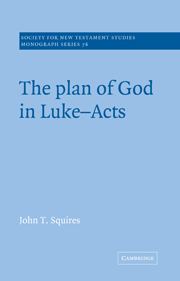Book contents
- Frontmatter
- Contents
- Acknowledgements
- List of abbreviations
- 1 The plan of God in Luke–Acts
- 2 The Programmatic role of providence in hellenistic historiography
- 3 Providence: God at work in human history
- 4 Portents: signs of divine action in human history
- 5 Epiphanies: inspired indications of the plan of God
- 6 Prophecy: foretelling and fulfilling the plan of God
- 7 Fate: the necessity of the plan of God
- 8 Conclusions
- A select bibliography
- Index of Greek words
- Index of subjects and authors
- Index of biblical references
4 - Portents: signs of divine action in human history
Published online by Cambridge University Press: 22 September 2009
- Frontmatter
- Contents
- Acknowledgements
- List of abbreviations
- 1 The plan of God in Luke–Acts
- 2 The Programmatic role of providence in hellenistic historiography
- 3 Providence: God at work in human history
- 4 Portents: signs of divine action in human history
- 5 Epiphanies: inspired indications of the plan of God
- 6 Prophecy: foretelling and fulfilling the plan of God
- 7 Fate: the necessity of the plan of God
- 8 Conclusions
- A select bibliography
- Index of Greek words
- Index of subjects and authors
- Index of biblical references
Summary
Luke attests to God's providential oversight by certain ‘miraculous’ means. He refers to the signs and wonders which God performs and reports a number of healings which Jesus is able to perform because ‘God was with him’ (Acts 10.38). This function of emphasizing God's ongoing guidance of history by portentous events shares certain similarities with the way such events are presented in hellenistic histories. Nevertheless, such phenomena are critically evaluated by Diodorus, Dionysius and Josephus, as well as by Luke, who reports that both Jesus and Paul cast out demons which attempt to hinder or oppose the agents of God's plan. Luke thus uses this ‘miraculous’ domain to confirm his presentation of God's providential guidance and to show how such events play a significant role in the plan of God.
Portents in Hellenistic historiography
Signs sent by the gods
The hellenistic historians we have considered demonstrate the popular acceptance of the role of divine interventions in human history. Both Dionysius of Halicarnassus and Diodorus Siculus report many such portentous occurrences, which were popularly considered to have been signs from the gods indicating their will. The science of divination arose as a means of interpreting the significance of such omens, which Cicero divided into two main categories (alterum artis est, alterum naturae, De div. 1.6. II) in order to make sense of the bewildering range of ways in which the gods were believed to have been communicating.
- Type
- Chapter
- Information
- The Plan of God in Luke-Acts , pp. 78 - 102Publisher: Cambridge University PressPrint publication year: 1993



